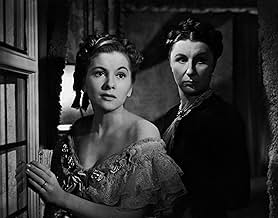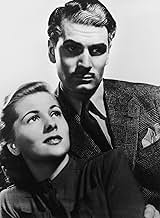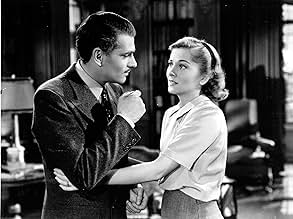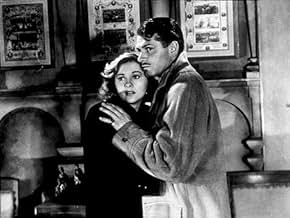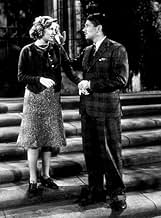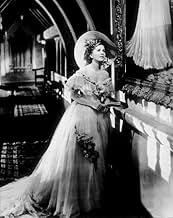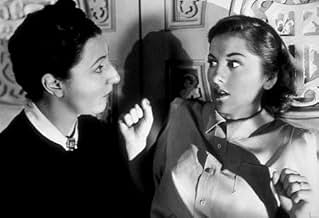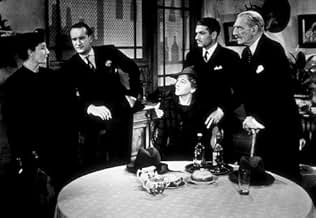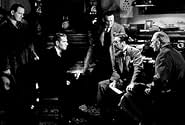Un'ingenua ventenne accetta di sposare un ricco e affascinate vedovo, e si trasferisce con lui nella splendida magione di Manderley. Ad attenderla, però, c'è l'ombra di Rebecca, la moglie de... Leggi tuttoUn'ingenua ventenne accetta di sposare un ricco e affascinate vedovo, e si trasferisce con lui nella splendida magione di Manderley. Ad attenderla, però, c'è l'ombra di Rebecca, la moglie defunta che è ancora viva nel ricordo di molti.Un'ingenua ventenne accetta di sposare un ricco e affascinate vedovo, e si trasferisce con lui nella splendida magione di Manderley. Ad attenderla, però, c'è l'ombra di Rebecca, la moglie defunta che è ancora viva nel ricordo di molti.
- Regia
- Sceneggiatura
- Star
- Vincitore di 2 Oscar
- 10 vittorie e 10 candidature totali
- Maid
- (non citato nei titoli originali)
- Policeman
- (non citato nei titoli originali)
Riepilogo
Recensioni in evidenza
The plot of very precisely structured. It consists basically of a man who is the dream of many women in the 1940s audience: ruggedly handsome, intelligent, keen witted, a bit commanding but not too much, fabulously wealthy, a touch roguish, and mysterious. It's the mystery that provides the plot engine. Every incident of his past emotional life needs to be pried out of Maxim deWinter (what a name, suggesting frigidity and distance) as if it were an abcessed tooth. Each secret, as he reveals it, is a surprise to his wife. Except for the final secret uncovered in the plot, which surprises everybody. Maxim could clear the whole mystery up with an hour's worth of private conversation with his wife. But of course he doesn't, or else there would be no story. That's why Hamlet takes so long to slaughter Claudius. And why the Indians don't shoot the horses as they're chasing the stagecoach.
The acting. Olivier is extremely good at impersonating deWinter with all his charm and challenge. George Sanders is the best cad that the movies ever produced, and he proves it again here. Mrs. Danvers has a face and an expression that looks like an ice sculpture. The implicit lesbianism in her character of course had to remain implicit, but it is still rather a shock when she tenderly unfolds Mrs. DeWinter's nightie and says smoothly, "Look, you can see my hand through it." As for Joan Fontaine, a friend in Ireland said of her performance, "She does the shivering wife very well." Precisely put. With her delicate bone structure, fragile looking limbs, and her overall ikabani flower arrangement appearance, her wide asymmetrical eyes, with one brow arching up over her pale forehead, she looks about to faint with fright through half the movie. The only thing coarse about her is her wardrobe: bulky knit sweaters over her girlish bosom, long flapping drab skirts over her small but saucy rump, and those clodhoppers she wears while clunking about the house. She does the shivering naif in at least two other films of the period -- Hitchcock's "Suspicion" and "Jane Eyre." In fact, rummaging through the disarranged attic that is my long-term memory, I can't really remember her "doing" any other role.
It's the closest Hitchcock ever came to making what was then called "a woman's picture." It received a "best picture" Oscar, which went to Selznick. Something Hitchcock seemed to resent for the remainder of his life. It was a commercial and critical success and it deserved to be.
The movie, on the whole, is similarly amazing, capturing the spirit and the tone of those great Gothic romances. Watching Rebecca, I was reminded (pleasantly) of Wuthering Heights; I do not mean to suggest that in some way this film re-tells the tale of Cathy and Heathcliff, but rather that Rebecca has the feel of Bronte's novel (I am most certainly not talking about the William Wyler adaptation a few years before the release of Rebecca. That's a terrible film that somehow manages to mis-interpret the novel).
I must assume that the guiding hand of Hitchcock played no small role in recreating the feel of a Gothic romance. There are very few that would be able to take a love story, infuse it with such gloom, with such a sense of foreboding, and still manage to create something that ends happily without it feeling like a cop-out. I'd also like to draw everyone's attention to the incredibly moving section of the film that occurs between the arrival of the second Mrs. DeWinter at Mandalay and the masqued ball. The emotional strain on the Joan Fontaine character is so palpable, so absolutely taxing, that it actually pains me to watch. I hurt along with her. Few other movies affect me so emotionally - one of them is Vertigo.
All in all, this is a fantastic piece of film-making from Hollywood's golden age. Laurence Olivier is in top-form, as he plays the quiet, sad Maxim and George Sanders is positively hateful.
10/10 - a visceral masterpiece
The first thing that you notice is the outstanding cinematography. You have to remember that this movie was made in 1940, when they didn't have the technology we have now. But that first shot of the water beating up against the rocks grabs you and for one split second you wonder if maybe this isn't part of the movie but rather something filmed just recently. But then you see the familiar face of Laurence Olivier, reminding you that this was made 60 years ago, a fact that forever amazes me. The only oscar it won besides Best Picture was well deserved.
Another thing that makes it such a wonderful film is the acting. I have debated on whether Laurence Olivier's character, the tortured Maxim de Winter, is the pitiable character or if his second wife played by Joan Fontaine is really the one to feel sorry for. Every time I watch it I see it from a different point of view. Joan Fontaine is excellent. Laurence Olivier is wonderful, but that's no surprise. The only thing that bugs me is that it seems in every movie he's in (well, at least, everything I've seen him in), he always plays the same type of character. But he's extremely good at it, so I suppose it doesn't matter.
But although Joan Fontaine and Laurence Olivier are wonderful, Judith Anderson steals the show! The first time I watched the movie, I was immediately grabbed by her stunning performance as the sinister Mrs. Danvers. You hardly notice the other characters when she's in the scene. She acted the part so well that it's strange to imagine that she was any different in real life.
With a wonderful storyline, and a very surprising ending, Rebecca well deserves the title as the only of Hitchcock's films to win the oscar for Best Picture. Although it may not be the most famous of all his films, it is without a doubt the greatest
Oscars Best Picture Winners, Ranked
Oscars Best Picture Winners, Ranked
Lo sapevi?
- QuizOver 20 actresses were screen-tested for the role of Mrs. de Winter, which eventually went to newcomer Joan Fontaine. One of them was Vivien Leigh, for whom Sir Laurence Olivier was pressing, as they were a couple at the time.
- BlooperIn the outside take of Manderley seen in the scene where the Narrator stares at one window being closed, it's a miniature, as is the 'Mrs Danvers' dummy dressed in black. You can realize this by the motion of the window as it's being closed, not in a continuous way, but by little fast jumps, which look too unreal.
- Citazioni
[the new Mrs. de Winter wants to dispose of Rebecca's letters]
The Second Mrs. de Winter: I want you to get rid of all these things.
Mrs. Danvers: But these are Mrs. de Winter's things.
The Second Mrs. de Winter: *I* am Mrs. de Winter now!
- Curiosità sui creditiThe original 1940 credits read "Selznick International presents its picturization of Daphne Du Maurier's 'Rebecca'". The credits on the re-issue version read "The Selznick Studio presents its production of Daphne Du Maurier's 'Rebecca'".
- Versioni alternativeThe opening credits were re-done (with different font) for the 1950's re-release of the movie. It is these credits that have turned up on all telecasts of the film (even as recently as 2013) and all previous video releases. The Criterion release (which is now only available through outlet stores) restores all of the credits to their original form.
- ConnessioniEdited into L'ultimo tycoon: Pilot (2016)
- Colonne sonoreLove's Old Sweet Song (Just a Song at Twilight)
(1884) (uncredited)
Music by J.L. Molloy
Hummed by Joan Fontaine
I più visti
Dettagli
Botteghino
- Budget
- 1.288.000 USD (previsto)
- Lordo in tutto il mondo
- 113.328 USD
- Tempo di esecuzione2 ore 10 minuti
- Colore
- Proporzioni
- 1.37 : 1
Contribuisci a questa pagina




